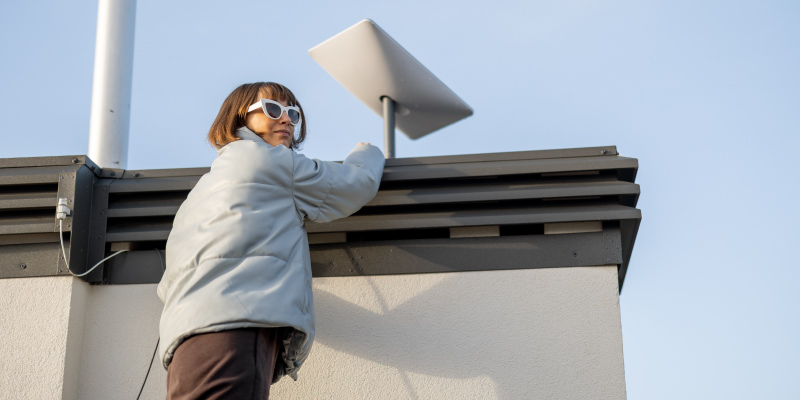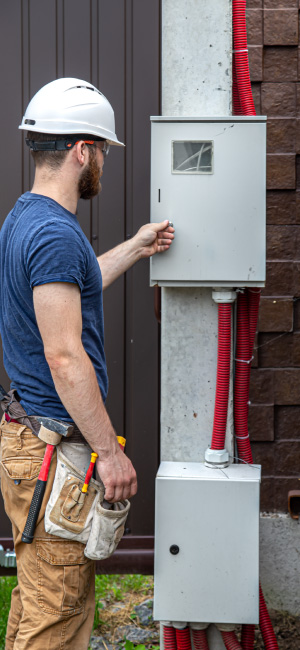Troubleshooting Your Satellite Connection: Expert Advice

Amanda Morgan

Expert advice on troubleshooting your satellite connection for beginners
Welcome to the world of satellite internet, where you can enjoy high-speed connectivity even in remote areas. For the tech-inclined, having a dependable satellite internet connection is essential for their day-by-day life - whether it's work, play or entertainment. But like any technology, satellite internet is not immune to issues.
Troubleshooting your satellite connection can be a tricky endeavor, with many elements influencing the speed and dependability of your internet service.
In this blog post, we'll dive into factors that can affect satellite internet connections and provide helpful tips on troubleshooting them effectively.
We'll discuss the importance of understanding satellite internet speeds and what may cause slow speeds or connection drops. Then, we'll explore possible solutions for these problems as well as considerations when trying a new satellite provider. Finally, we'll touch upon other common issues you might face while using a satellite connection and how to resolve them effectively.
By the end of this all-in-one guide on troubleshooting your satellite connection, you will be equipped with valuable insights to enhance your overall experience with this technology.
A quick overview of satellite internet
You might be familiar with satellite internet, or you might not. If you've ever wondered why your satellite internet speeds seem to be a rollercoaster ride, it's time for some enlightenment. Unlike other types of internet services, satellite internet has higher latency due to the long-distance data travels between your device and the satellite.
Satellites orbiting Earth transmit data signals back and forth between your device and the World Wide Web. This allows you to access the internet even when traditional internet providers are out of reach. While it's an excellent solution for rural dwellers or digital nomads, there are some challenges that come with using satellite services, like its speed. Here are two things to keep in mind when it comes to satellite internet:
- The need for speed: Knowing your actual internet speed is crucial in understanding how it affects your online experience. Don't worry; there are plenty of online speed tests available to measure it accurately.
- A little patience goes a long way: Remember that patience is key when dealing with satellite connections as they might not always offer lightning-fast speeds like their terrestrial counterparts (i.e. fiber internet).
Remember to keep tabs on your connection and tweak it to get the best performance.
Troubleshooting slow satellite internet speeds
Have you ever wondered why your satellite internet speeds can be slow? Factors like network congestion, weather, or misconfigured equipment might be the culprits. But don't worry. We've got some tips and tricks to help you boost those sluggish speeds.
Troubleshooting slow satellite internet speeds requires a deep dive into your current connection setup in order to identify any potential issues that may be affecting performance.
- Check your data usage: Some internet providers limit your data usage. If you're nearing that limit, consider upgrading to a plan with more or unlimited data. To find out how much data you have used, consult your provider's website or customer support.
- Clear your cache: A cluttered cache can hinder speed performance. Try clearing it using these simple steps from PCMag.
- Optimize Wi-Fi network: Ensure you have placed your router in an optimal, central location for better signal strength - check out this helpful guide from CNET.
- Dish realignment: Over time, dishes may shift and become misaligned. You could either a)DIY it with this helpful blog: How To Align A Satellite Dish; or b) call in some help from your internet provider and have a professional do it for you.
Now let's look at troubleshooting connection drops, which is an even more complex issue that requires careful attention.

Troubleshooting connection drops
Have you ever experienced a sudden loss of connection in the middle of an intense gaming session or while binge-watching your favorite show? That's what we call connection drops, and they can be quite annoying. Don't fret - here are some ideas to help keep those pesky connection drops at bay.
- Check your cables and connections: Ensure that all cables are secure and not damaged. Damaged cables can be the cause of connection drops.
- Reset your equipment: Yes, it really can be as simple as restarting your modem and router to resolve connection issues.
- Check for obstructions: Trees or other objects blocking your satellite dish may cause connection drops. Make sure it has a clear view of the sky.
Moving on to trying a new satellite provider is also an option if your current one isn't meeting your needs or expectations. If you're in the market for a new provider, let us hook you up with the best satellite internet providers in the United States: Viasat and HughesNet.
Troubleshooting your satellite connection
If you're experiencing issues with your satellite internet connection, don't worry. There are several steps you can take to troubleshoot the problem before considering a new internet provider. Here are some tips:
- Check the weather: Bad weather can interfere with your satellite signal. Wait for the weather to clear up and try again.
- Inspect your equipment: Check all cables and connections to ensure everything is properly plugged in and functioning. If you notice any damage, replace the equipment.
- Restart your modem and router: Sometimes, a simple restart can fix connectivity issues. Unplug both devices, wait a few seconds, and plug them back in.
- Clear obstructions: Make sure there are no physical obstructions blocking your satellite dish's line of sight to the sky.
- Update your software: Check for any available updates for your modem and router software and install them.
If you've tried all of these troubleshooting steps and are still experiencing issues, it may be time to consider switching to a new internet provider. Here are some steps to help you make the switch:
- Coverage: Verify that the new provider offers service in your area.
- Plan offerings: Compare plans and pricing from different providers for the best deal.
- Equipment compatibility: Ensure your existing equipment works with the new provider or budget for any necessary upgrades or rental fees.
Making a well-informed decision can lead to improved satellite internet performance and overall satisfaction. Trying a new satellite provider is often the best way to ensure you get the most reliable connection and service.

Troubleshooting other common issues
Aside from slow speeds and connection drops, satellite internet users may encounter other pesky problems like signal interference and equipment malfunctions. Fear not, for we have some handy troubleshooting steps to save the day.
- Check for signal interference: Your neighbor's fancy new gadget or even your own appliances can interfere with your satellite signal. Make sure there are no electronic devices obstructing your dish.
- Evaluate equipment: A quick inspection of your modem, router, and satellite dish can reveal any issues that need fixing. If you're unsure about what to look for, consult the user manual or call your provider's customer support team to guide you on satellite equipment maintenance.
It is important to recognize the potential issues that can arise when troubleshooting a satellite connection, and how best to resolve them.
Troubleshooting your satellite connection FAQs
What is the main problem with satellite internet service?
The main problem with satellite internet service is its susceptibility to weather-related disruptions. Heavy rain, snow, or storms can degrade signal quality, leading to slow speeds and intermittent connectivity issues. Additionally, high latency caused by signal distance can impact real-time applications like gaming and video conferencing.
Why does my satellite keep losing signal?
If your satellite keeps losing signal, there could be various factors at play, including:
- Bad weather conditions (rain fade)
- Physical obstructions blocking line-of-sight from dish-to-satellite (e.g., trees)
- Misaligned antenna/dish positioning
- On-site equipment, cables, or connector damage
- Sun outages during specific periods of time each year
If you're unable to resolve the issue on your own, contact your internet provider for further assistance.
Bye-bye troubles. Hi, high-speed satellite internet!
Troubleshooting your satellite connection can be a challenge if you're new to it. But keep in mind that there are many solutions you can try before throwing the towel and contacting your satellite internet provider or leaving them for a new one. Remember that many factors come into play when it comes to internet connection.
Something as insignificant as leaving your phone around your router can interfere with the signal strength, a bad storm may make your slow speeds or just having too many people connected in your area can cause network congestion.
These are minor, common issues you can use this guide to troubleshoot. If all else fails and your efforts aren't paying off, trying a new internet provider is also an option.
At Homelinkd, we understand how important reliable internet is for both work and play. If you're still struggling with your satellite connection, head over to HomeLinkd.com to get connected to the fastest satellite internet provider in the U.S. today.










